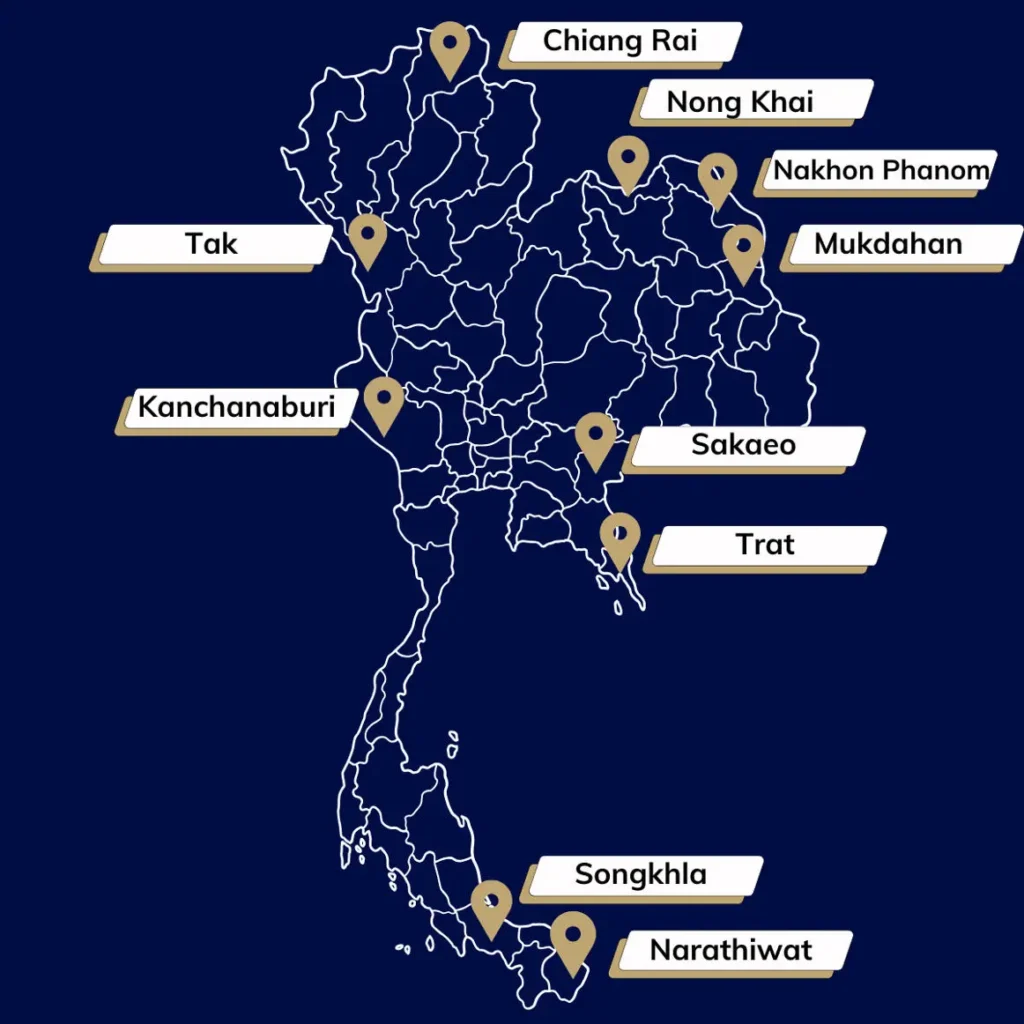Introduction:
In recent years, the Thai government has introduced several programs and policies in an effort to promote economic growth in its Southern Economic Zones (SEZs). The Government is looking to encourage investment and business activities in provinces that are not normally popular choices for businesses.
This article explores the recent tax rate reductions introduced under Royal Decree No. 783 and Royal Decree No. 784, and their effect on businesses and individuals operating within these designated areas.
Key Points
- New tax incentives introduced in Thailand’s Southern Special Economic Zones include a 3% corporate tax rate on net profits and a 0.1% personal income tax rate, effective from January 2024 to December 2026.
- The Southern SEZs include Narathiwat, Pattani, Yala, Satun, and parts of Songkhla.
- Foreign companies operating in SEZs can benefit from 100% ownership rights, import duty exemptions, and eight-year corporate tax exemptions with possible five-year extensions.
- Target industries include agro-industry, electronics, automotive, medical devices, logistics, and tourism-related businesses.
- Skilled employees working in Southern SEZs qualify for a reduced 3% withholding tax rate, provided they have a bachelor’s degree and five years of relevant experience.
Understanding Special Economic Zones (SEZs)
Special Economic Zones (SEZs) are designated areas where the Thai government will provide special incentives to encourage economic growth and attract investment.
Around the world, SEZs have proven effective in increasing industry, creating jobs, and promoting trade.
In Thailand, SEZs are being used as part of a strategy to improve regional economic development and international trade. The Thai government has established SEZs across the country with targeted incentives and relaxed regulations to make investing easier and more attractive for businesses.
Thailand’s Special Economic Zones
SEZs in Thailand have been strategically placed near borders and major trade routes. By locating the SEZs in such areas, businesses have easy access to neighbouring countries like Myanmar, Laos, Cambodia, and Malaysia.

These zones are located in these areas to allow cross-border trade and logistics, reducing the costs and issues associated with moving goods and materials.
Thailand’s Special Economic Zones focus on promoting specific industries that include:
- Agro-industry, fisheries and related businesses
- Ceramic products manufacturing
- Textile, clothing and leather manufacturing
- Furniture manufacturing
- Gems and jewellery manufacturing
- Medical devices manufacturing
- Automotive, machinery and parts manufacturing
- Electronics and electrical appliances manufacturing
- Plastics manufacturing
- Pharmaceutical’s manufacturing
- Logistic businesses
- Industrial zones or industrial estates
- Businesses that support tourism

Investment Incentives
Thailand’s Special Economic Zones (SEZs) offer great incentives and advantages for foreign investors. These SEZs are designed to encourage economic growth by providing a competitive business environment, attracting foreign direct investment (FDI), and improving Thailand’s position as a key player in the ASEAN market.
In order to attract both domestic and foreign investment, businesses who undertake their business activities within Thailand’s SEZs are eligible for special incentives, including:
Tax Benefits
To encourage more businesses to set up in these zones, Thailand offers a range of generous incentives designed to lower costs and boost long-term profitability.
Corporate Income Tax Exemption
Businesses operating within certain designated industries can benefit from an eight-year exemption from corporate income tax, with a potential extension of an additional five years.
Import Duty Exemptions
Companies will also be exempt from import duties on machinery and raw materials essential for production, significantly reducing operational costs.
Eligible companies will also be able to claim an exemption of import duties on raw and essential materials used in manufacturing for export for five years
Double Deductions
For a period of up to ten years, businesses can enjoy double deductions on expenses related to transportation, electricity, and water supply.
Other Deductions
Companies that operate within SEZs may also receive a 25% deduction of the costs of installation or construction of facilities in addition to the deduction of normal depreciation.
General Business Benefits
In addition to tax benefits, SEZs offer various non-tax benefits that can greatly improve the ability for a foreign business to operate in Thailand. The general benefits include:
Foreign Ownership Rights
Within Thailand’s SEZs, foreign ownership rules are often more relaxed and in many cases, foreign businesses can have 100% ownership of a company, depending on the industry.
Land Ownership
Foreign investors are permitted to own land within SEZs for buildings such as factories or warehouses.
Employment of Foreign Workers
Businesses will be able to employ foreign skilled and unskilled labour with reduced requirements. More information as to the exact requirements under the new Decree are expected soon, we will update accordingly when announced.
Read also: Thailand’s S-Curve Industries: Driving Economic Growth & Innovation
Incentives Specifically for SEZs Located in the South of Thailand
Royal Decree No. 783, issued on June 5, 2024, introduced substantial tax incentives for businesses and individuals undertaking operations within the SEZs located in the South of Thailand, specifically Narathiwat, Pattani, Yala, Satun, and certain districts of Songkhla. These incentives are designed to lower the financial burden on companies and promote economic activity in these regions.
The tax following tax incentives, will be available from January 1, 2024, through December 31, 2026.
Corporate Income Tax Reductions
One of the most significant benefits of Royal Decree No. 783 is the reduction of corporate income tax rates of only 3% on net profits derived from activities within the SEZ. Eligible companies can benefit from a reduced rate.
To qualify for this reduced rate, businesses must meet specific criteria, including:
- Conducting operations within designated SEZs.
- Deriving income from manufacturing, sales, or services within the SEZ.
Personal Income Tax Reductions
In addition to corporate tax relief, Royal Decree No. 783 also provides significant reductions in personal income tax rates for individuals operating businesses within SEZs.
Individuals are eligible for a significantly reduced personal income tax rate of 0.1% on assessable income. This reduced rate applies to income from manufacturing, sales, or services conducted within SEZs.
Tax Rate Reductions for Skilled Employees
Royal Decree No. 784 also introduces the following tax benefits for skilled employees and experts working in these areas:
Withholding Tax Rate Reductions
Eligible employees can benefit from a reduced withholding tax rate of 3% on their assessable income.
To qualify for the reduced withholding tax rate, employees must meet specific educational and experiential requirements, including:
- Relevant work experience, typically five years or more, supported by appropriate documentation.
- A minimum educational qualification of a bachelor’s degree or equivalent.
Corporate Income Tax Deductions for Investments
In addition to tax rate reductions, Royal Decree No. 784 introduces corporate income tax deductions for investments made in SEZs. This measure is designed to attract new investment and stimulate business growth in the region.
To qualify for these deductions, companies or partnerships must meet certain eligibility requirements, including not having had any prior business operations within the SEZ for at least one year before making the investment.
There are also restrictions on the sale or transfer of shares or partnership interests in SEZ businesses.
Please note that this article is for information prposes only and does not constitute legal advice


